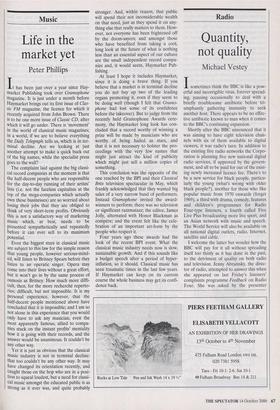Music
Life in the market yet
Peter Phillips
It has been just over a year since Hay- market Publishing took over Gramophone magazine. It is just under a month before Haymarket brings out its first issue of Clas- sic FM magazine, the licence for which it recently acquired from John Brown. There Is to be one more issue of Classic CD, after which it will go under. There is 'movement' in the world of classical music magazines; In a world, if we are to believe everything the Daily Telegraph tells us, which is in ter- minal decline. Are we looking at just another attempt to make a quick buck out of the big names, while the specialist press goes to the wall?
The complaint laid against the big classi- cal record companies at the moment is that the half-decent people who are responsible for the day-to-day running of their artists' lists (i.e. not the faceless capitalists at the top of the mega-companies which actually own these businesses) are so worried about losing their jobs that they are obliged to think of very short-term profits. Obviously this is not a satisfactory way of marketing music which, at best, needs to be presented sympathetically and repeatedly before it can ever sell to its maximum potential.
Even the biggest stars in classical music are subject to this law for the simple reason that young people, however serious-mind- ed, will listen to Britney Spears before they listen to an operatic singer. Opera may Come into their lives without a great effort, but it won't go in by the same process of osmosis as Britney. How much more diffi- cult, then, for the more recherché reperto- ries; difficult, but not impossible. It is my personal experience, however, that the half-decent people mentioned above have concluded that it is impossible; and I am so not alone in this experience that you would only have to ask any musician, even the most apparently famous, allied to compa- nies stuck on the instant profits' mentality how it is going with their records, and the answer would be unanimous. It couldn't be any other way.
Yet it is just as obvious that the classical music industry is not in terminal decline: that too couldn't be any other way. It may have changed its orientation recently, and Caught those on the hop who are in a posi- tion to squeal loudest, but a need for classi- cal music amongst the educated public is as strong as it ever was, and quite probably stronger. And, within reason, that public will spend their not inconsiderable wealth on that need, just as they spend it on any- thing else that really matters to them. How- ever, not everyone has been frightened off by the doom-sayers; and amongst those who have benefited from taking a cool, long look at the future of what is nothing less than an essential aspect of our culture are the small independent record compa- nies and, it would seem, Haymarket Pub- lishing.
At least I hope it includes Haymarket, since it is doing a brave thing. If you believe that a market is in terminal decline you do not buy up two of the leading organs promoting it, even if they seem to be doing well (though I felt that Gramo- phone had lost some of its confidence before the takeover). But to judge from the recently held Gramophone Awards cere- mony, the Haymarket long look has con- cluded that a record worthy of winning a prize will be made by musicians who are worthy of being hailed as stars, and that it is not necessary to bolster the pro- ceedings with the very few names that might just attract the kind of publicity which might just sell a million copies of something.
This conclusion was the opposite of the one reached by the BPI and their Classical Brits television spectacular in May, which frankly acknowledged that they wanted big sales of a very narrow band of performers. Instead Gramophone invited the award- winners to perform; there was no television or significant razzmatazz; the editor, James Jolly, alternated with Honor Blackman as compere; and the event felt like the cele- bration of an important art-form by the people who respect it.
Four years ago these awards had the look of the recent BPI event. What the classical music industry needs now is slow, sustainable growth. And if this sounds like a budget speech after a period of hyper- inflation, so it should. Classical music has seen traumatic times in the last few years. If Haymarket can keep on its current course the whole business may get its confi- dence back.


















































































 Previous page
Previous page